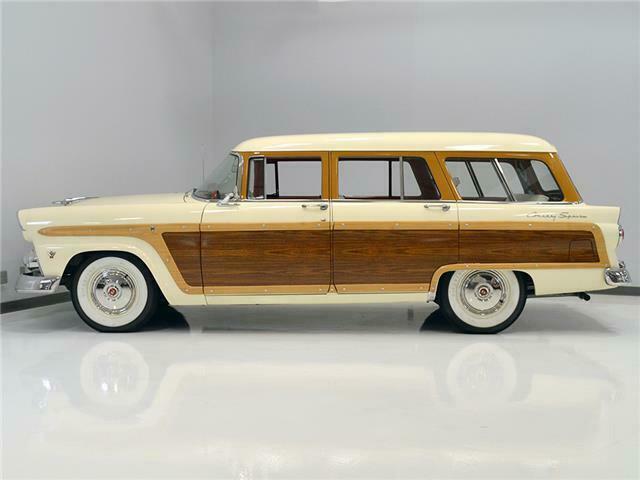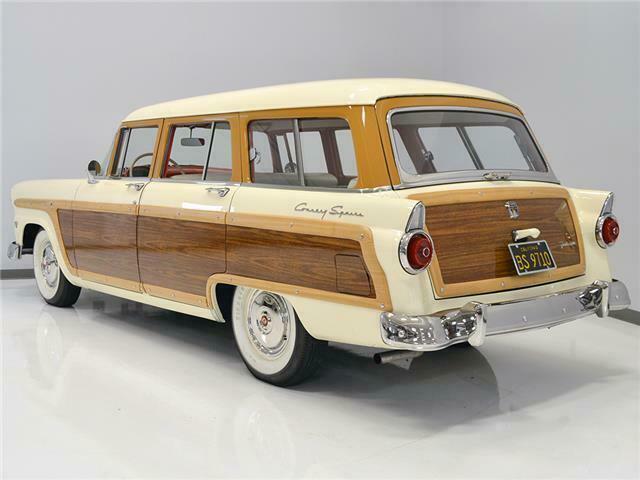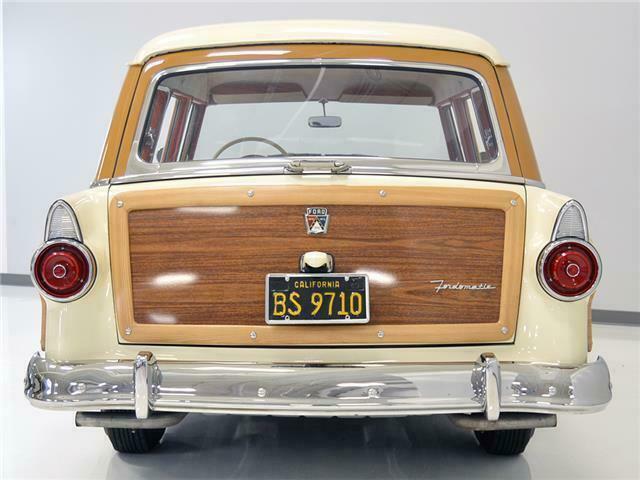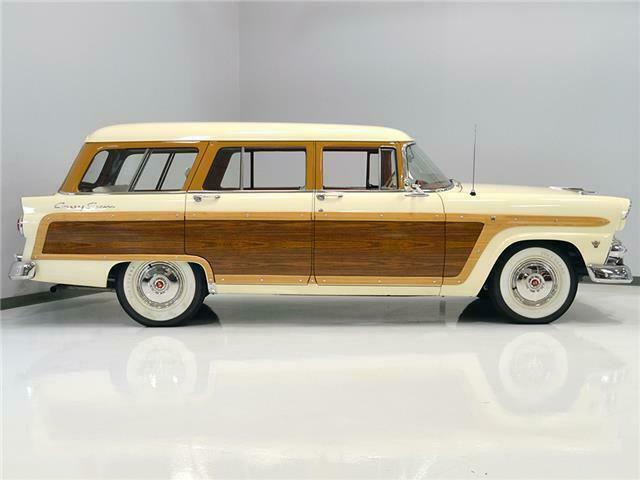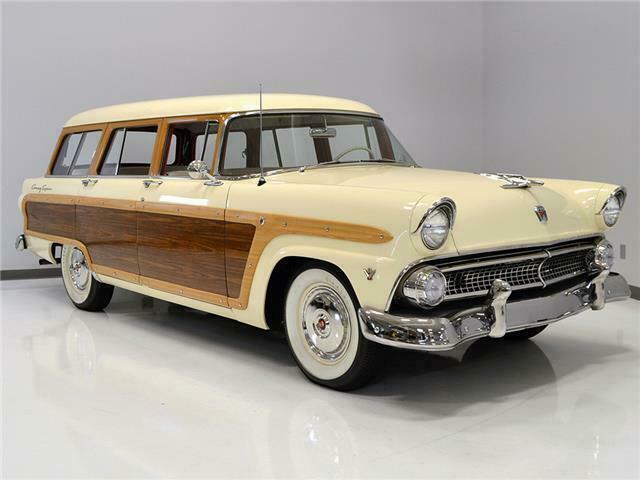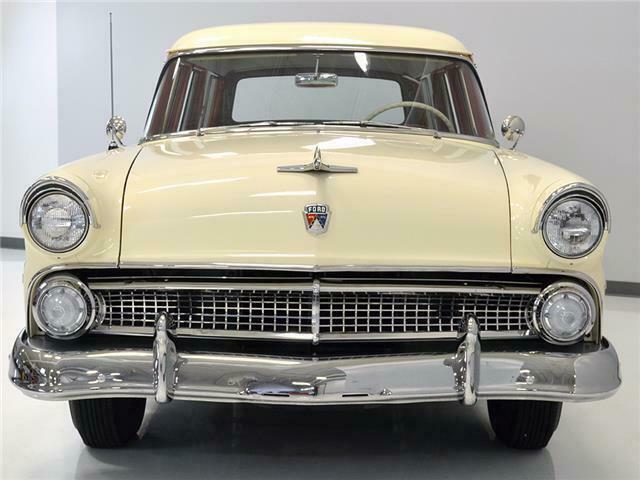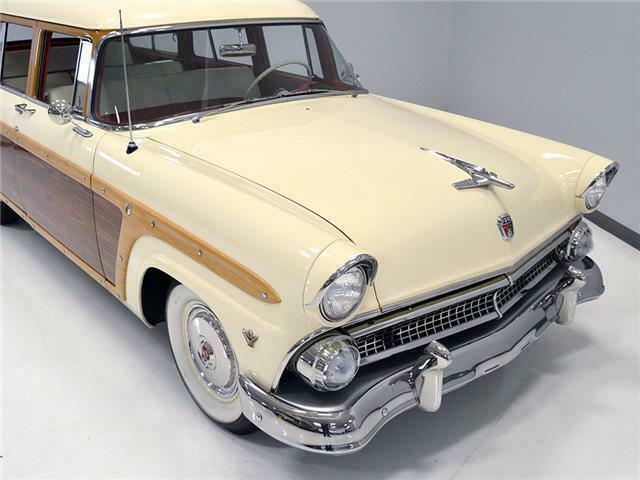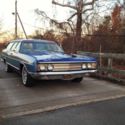1955 Ford Country Squire 1394 Miles White Station Wagon 272 cubic inch V8 Autom
| Make: |
Ford |
| Model: |
Other |
| Type: |
Station Wagon |
| Trim: |
-- |
| Year: |
1955 |
| Mileage: |
1394 |
| VIN: |
U5FY245003 |
| Color: |
White |
| Engine: |
272 cubic inch V8 |
| Fuel: |
Gasoline |
| Transmission: |
Automatic |
| Drive type: |
-- |
| Interior color: |
Red |
| Vehicle Title: |
Clean |
| Item location: |
Local pick-up only |
1955 Ford Other -- Additional Info:
In the good old days, cars like this 1955 Ford Country Squire station wagon were a staple of suburban America. Many of us can remember family vacations in cars just like this, and that may explain why wagons are once again popular with collectors—the pull of nostalgia is what drives the hobby, after all. It would be unfair to refer to this car as merely a station wagon, however. The Country Squire was the top-of-the-line Ford in 1955 and with beautiful styling and V8 power, it wouldn’t be impossible to imagine a garage in the 1950s with both one of these and a Thunderbird parked next to it and an owner who enjoyed them both equally. Hailing from California, this lovely Country Squire was recently treated to a high-quality frame-on restoration about seven years ago. As a solid west-coast car, there was no need to disassemble it down to the molecular level, and as a result it retains that tight, all-of-a-piece feel that the best original cars have while showing off freshened paint, interior, and mechanical pieces. According to the door tag, it’s wearing correct Colonial White paint that has a bit of cream in it so it looks warm and inviting, particularly next to the faux wood panels. Fit and finish are very good, with doors that fit well and close without slamming, a tailgate that opens and closes easily, and proper hood alignment that sits right. Modern urethane paint gives it a deep shine that’s unquestionably better than new and should last for years to come. The contrasting tan window surrounds were Ford’s way of tying the new all-steel “woodies” to the actual wood wagons of the past, and the masking is razor-sharp to give it a clean, crisp look. Of course, no wagon discussion is complete without talking about its most distinctive feature, and while the 1955 Fords no longer used real wood, Ford worked hard to give it a proper look. The lighter areas are fiberglass with a woodgrain tone while the larger panels were originally Dy-Noc decals. Today, the fiberglass surrounds are in exceptionally good condition with light woodgrain effects and the decals are sharp and well-rendered. According to several sources, there were apparently two different versions of the woodgrain available, the plain panels shown on this car and a striped pattern designed to replicate the look of a wooden-hulled boat. Either way, the look is quite convincing and you will note that the expert installation wrapped the decals around all the panel edges and matched the grain pattern, indicative of the car’s impressive attention to detail. And with all this talk of wood, it’s easy to overlook the fact that all the chrome has been restored, including the bumpers, grille, door handles, and the name badges. Even the Ford crests on the nose and tail are rendered with bright colors and crisp details. Inside, the two-tone red and white interior is perfect for the flashy ‘50s. Nicely restored, it features correct patterns and materials throughout, from the pleated seats to the surprisingly plush carpets which make the wagon feel quiet and upscale inside. Of note, this car carries all three row of seating, with the third row bench being rather rare as early owners often removed it to increase cargo space. Beautiful door panels are streaked with bright stainless trim and new door and window handles. A glance into the hinge pockets reveals why California cars are so special, and the doors open and close easily, again suggestive of an accident-free history. The steering wheel and gauges were restored and look almost new, and even the AM radio is working propelry, a relative rarity in the old car world. The second row seat folds flat for carrying long objects and the passenger-side seat tips forward for access to the third row, which is surprisingly comfortable even for full-sized folks. There’s a bright white headliner overhead and the cargo bay is finished in matching red carpet with bright rub strips. The engine is a 272 cubic inch Y-block V8 that’s been rebuilt and neatly detailed mostly the way Ford did it. There’s bright Ford Red paint on the block, heads, and intake manifold, and a proper oil bath air cleaner up top. Perhaps the only demerits are the exhaust manifolds, which were left in raw cast iron following the restoration and look a bit rough today, but they are correct. You will also note that this car carries power steering, so it’s a pleasure to drive and a few upgrades such as a pleasant-sounding dual exhaust system make it easy to love. Correct markings and reproduction decals were used throughout the engine bay. It starts quickly and easily, even after prolonged storage, and once it comes off the choke, it idles smoothly. On the road, it pulls easily with impressive low-end torque and the 3-speed Ford-O-Matic automatic transmission shifts with a delightful firmness. With 3.54 gears, it’s lively around town, yet happily cruises at 60 MPH with a happy burble from the twin tailpipes. The suspension and braking systems were rebuilt during the restoration, but one glance underneath reveals the true beauty of west coast cars—it isn’t shiny and perfect, but it is in great shape with only one patch above the passenger-side muffler. Correct Firestone wide whitewall tires have been fitted to the original wheels and crowned with a set of beautiful full wheel covers. We haven’t seen many Country Squires better than this. In fact, it is so nice that it was invited to the Concours of America at St. John’s a few years ago. This is the ideal car for the hobbyist with a family and it will always be the source of joy for folks who know what America looks like from the back seat. Call today!


